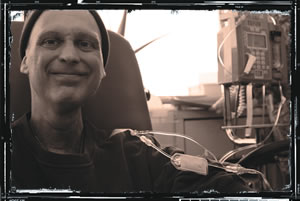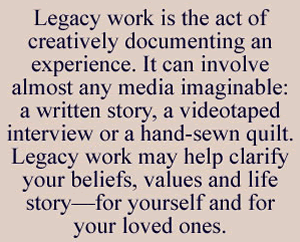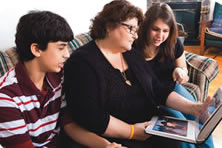How to Start a Conversation About Dying
By the time Bob Redick was diagnosed with squamous cell carcinoma in his left tonsil, the cancer had already spread into his lungs. He underwent aggressive treatment and enrolled in a clinical trial, but none of it stopped the cancer.

By early 2007, Redick knew he was out of options. His family -- wife Adriana and children Bobby and Melissa -- knew it, too. And yet they couldn't fully comprehend it.
When Bob Redick entered the hospital on Feb. 18, 2007, for a nosebleed that just wouldn't quit, it didn't occur to any of them that this would be the last two weeks of his life.
"We pictured it differently," said Adriana Redick. "Nobody said this could happen or that could happen. We just didn't put two and two together."
"We took it for granted that he'd still be here," said Bobby.
The will to survive is our strongest and most basic instinct. It's one thing to understand death in an intellectual way. Coping with it emotionally, though, is something completely different.
As the Redicks struggled with the idea that Bob would die, the family took some steps while he was still with them that they say made a terrible situation slightly more bearable.
Working together with a photographer and videographer, the family documented Bob's story. They recorded conversations about how Bob felt when he first saw Adriana. Bob spoke directly into the camera about his hopes for Melissa and Bobby, who were then 13 and 12, respectively. And he wrote letters to help keep the family on track after he knew he would be gone.
"Sometimes it's very hard to talk about, but it's from my heart," Bob says in one of the videotaped interviews. "We've gotten to see each other in a different light. We've had fun. If I do pass away, they do have something instead of nothing. I thought I was leaving them nothing."

Talking about dying is one of the most difficult conversations to start. But there is some evidence that people who have these conversations are more likely to have better quality of life when they are near death, said Sue Wintermeyer-Pingel, the University of Michigan Rogel Cancer Center's Grief and Loss Program manager. Caregivers may also fare better.
"Everyone always hopes for the best outcome, but for some, the focus of treatment may change from cure to care," Wintermeyer-Pingel said. "It's important to start talking. It's the only way to fully understand a patient's desires and priorities for care."
Although some people may have trouble broaching the subject of death, some patients want to talk about it more than their family and friends may realize, said Susan Urba, M.D., professor of internal medicine in the U-M Division of Hematology/Oncology. Everyone feels differently about what he or she wants to talk about and how much; the key, though, is to bring it up so that you know where a person stands.
Often people worry that they can't talk about death without giving up hope.
"Many people hope for a long life, but if a cure is not possible, then hope shifts to a peaceful and pain-free death," Urba said. "We all know we're going to die, but our first thought is always going to be 'How can we fight this?' It would be imprudent and unrealistic if all we did was push to extend life. The goal becomes, 'How can we make this as best as possible for the patient?'"
As Bob's cancer progressed, he made plans. He made sure Adriana knew where the keys and titles to all of his 13 cars were. A consummate tinkerer whose trade was making models for Ford Motor Co., Bob also told Adriana who to call for help with various chores around the house.
The family continued to work with Todd Hochberg, a Chicago-area photographer who bases his work around documenting the lives of people who are dying. Working in collaboration with Wintermeyer-Pingel and Donna Murphy, the Rogel Cancer Center's director of Complementary Therapies, Hochberg spent hours with the Redicks before and after Bob's death. The project was funded by donations to the cancer center's Patient & Family Support Services program.
The Rogel Cancer Center offers an array of complementary therapies to help patients work through their story. Art therapy, creative writing and music therapy are just a few services that can help patients develop legacy work, Murphy said.
Hochberg helped the family focus its energy on preserving the important stories, Adriana said, adding that it was difficult to take time to step back from the chaos of everyday life to reflect.
And for patients, Hochberg said, taking that time to reflect can help put their lives into perspective.
"It's not just about what you leave the family," Hochberg said, "but about who you are."
For Melissa Redick, it was difficult to admit that death was even a possibility for her father. Bob Redick talks in the videotaped interviews about sitting Melissa down to try to help shake her out of denial.
And yet, it was hard for him to do that. Because at some level, he, too, wanted to ignore it.

"I wish it would all go away," he said. "Just go back to normal."
Accepting death isn't something that comes naturally for most. Earlier this year, author Robin Romm published a book called "The Mercy Papers" that chronicled the last three weeks of her mother's life. In it, Romm is brutally honest about how furious she was that her mother was dying.
That life would go on as her mother lost her battle with breast cancer was unfathomable. That Romm's mother would be leaving her forever was tragic. That anything would ever be OK again was impossible to imagine.
"My mom was really an honest person who could handle quite a bit of grief and understood that my pain was going to be necessary. It wasn't something to be avoided," Romm said. "You can't really get to a place where you appreciate the world unless you grapple with the things that are ugly."
Two years after Bob's death, the Redicks still think of him daily. All but one of the cars-one that Bob had hoped to work on someday with Bobby-has been sold. And Adriana settles for kissing a photo of Bob each night.
But the photographs, the video and the letters are all still there. Including one to Adriana:
- "I love you forever and ever."
"So I have it in writing," Adriana said.
Tips for Better Communication

Be willing to talk about dying.
Sometimes people want to talk about death, but they're worried about upsetting their loved ones. If your loved one approaches you about it, he needs to talk. Don't shut him down.
Talk about how you want to live with cancer.
Even if your diagnosis is terminal, you still have choices about how you want to live every minute of your life. Think about what's important to you. Talk to your doctors about what to expect and what kinds of care options you will have. Plan ahead and make your wishes known.
Find ways to share what's important to you.
You don't have to hire a photographer to share your story. Talk into a tape recorder. Write letters to your family. Consider buying gifts or writing notes for future events.
Involve a friend.
If it's overwhelming to figure out where to start, have a friend or family member help you. By asking questions, a loved one can help you focus your story.
Consider complementary therapies.
The Cancer Center offers a wide array of services, such as art therapy or creative writing that can help you convey what you want your family and friends to know.
Do something else.
Don't get so caught up in preparations that you forget to be with your loved ones right now. Find time for distractions. Think of a reason to laugh.
Don't try to fix it.
Sometimes silence is the best thing for the moment.
Continue reading the Summer, 2009 issue of Thrive.
